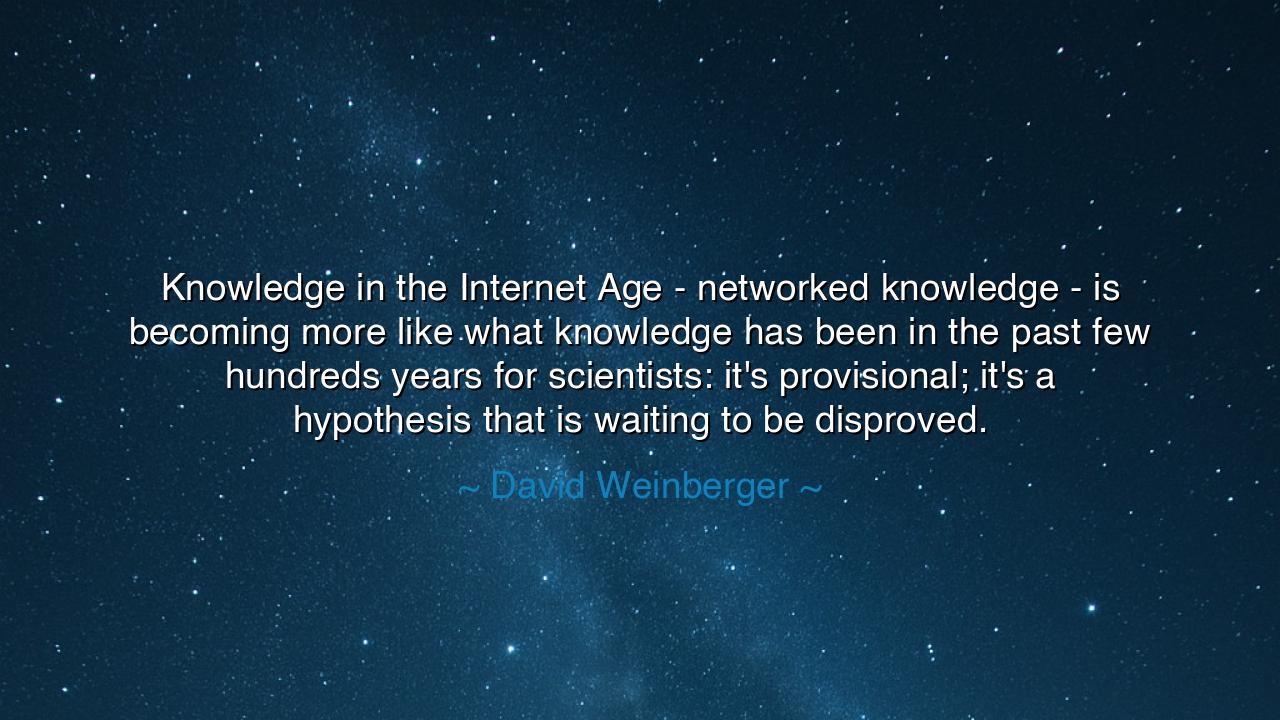
Knowledge in the Internet Age - networked knowledge - is becoming
Knowledge in the Internet Age - networked knowledge - is becoming more like what knowledge has been in the past few hundreds years for scientists: it's provisional; it's a hypothesis that is waiting to be disproved.






In the thoughtful and visionary words of David Weinberger, philosopher of the digital age, we hear a truth that belongs both to our time and to eternity: “Knowledge in the Internet Age—networked knowledge—is becoming more like what knowledge has been in the past few hundred years for scientists: it’s provisional; it’s a hypothesis that is waiting to be disproved.” This statement, though clothed in the language of modernity, bears the soul of ancient wisdom. For Weinberger speaks of the humbling transformation of the human mind — from certainty to curiosity, from rigid knowing to living inquiry. He reminds us that true knowledge does not stand still; it flows, it changes, it evolves with the movement of the world itself.
The origin of this quote lies in the shifting sands of the digital era — an age where information no longer dwells in guarded halls or printed tomes, but dances freely through networks, connecting countless minds across the globe. In earlier ages, knowledge was seen as a treasure to be preserved — the sacred domain of scholars, priests, and philosophers. It was recorded, sealed, and sanctified. But in our time, it has become networked, living within the vast web of digital exchange. Each new discovery is challenged, debated, reimagined — for the collective mind of humanity has never before been so intertwined, so alive, so restless. Weinberger saw in this not chaos, but a new form of wisdom: that to know now is not to cling, but to question.
In truth, his words echo the spirit of science itself, as born in the Renaissance and matured through the Enlightenment. The great scientists—Galileo, Newton, Darwin, Einstein—did not offer final truths, but hypotheses, knowing that every revelation is but a stepping stone toward the next. Galileo’s telescope shook the heavens, Newton’s laws redefined motion, and Einstein’s relativity transformed time itself. Yet none of these great minds claimed completion. Each, in humility, left space for the unknown. They knew, as Weinberger reminds us, that knowledge is provisional, not absolute; it is the ever-turning key that opens door after door, but never the final gate.
Consider the parable of Socrates, who, when declared the wisest of all men, answered, “I know that I know nothing.” In that confession lies the very foundation of wisdom — that certainty is the enemy of truth. Socrates, standing beneath the Athenian sun, understood what Weinberger now proclaims in the glow of digital screens: that to be wise is not to possess knowledge, but to dwell within the pursuit of it. The modern age, with its rivers of information, demands the same humility. Every link, every post, every theory, every voice — each adds to the vast tapestry of networked knowledge, yet none may claim to be the final thread.
There is, however, both glory and danger in this. For when knowledge becomes infinite and provisional, it can awaken wisdom—or confusion. The wise will use this boundless exchange to question, to discern, to grow. But the foolish will drown in it, mistaking noise for truth. Thus, Weinberger’s warning becomes clear: in an age where all may speak, one must learn anew how to listen, how to sift the temporary from the timeless, the echo from the song. For knowledge has never been more abundant, nor more fragile.
Let us then draw from this a lesson worthy of the ancients. Do not seek certainty, for it is the shadow of ignorance; seek understanding, which walks always in the light of change. Be as the scientist, the philosopher, the humble learner — ready to test, to revise, to begin again. In the Internet Age, where information flows like a vast sea, your task is not to build a tower of unshakable belief, but to learn how to sail. Build your vessel with curiosity, steer with humility, and let the winds of contradiction carry you toward deeper truth.
And so, my children of the digital dawn, remember this: all knowledge is a hypothesis, a flame passed from hand to hand through the ages. It is not perfection we seek, but participation in the great conversation of minds. Let us be bold enough to question, gentle enough to admit when we are wrong, and wise enough to see that truth is not a monument, but a living journey. For in this endless seeking — in this eternal rhythm of discovery and doubt — humanity draws closest to the divine.






AAdministratorAdministrator
Welcome, honored guests. Please leave a comment, we will respond soon